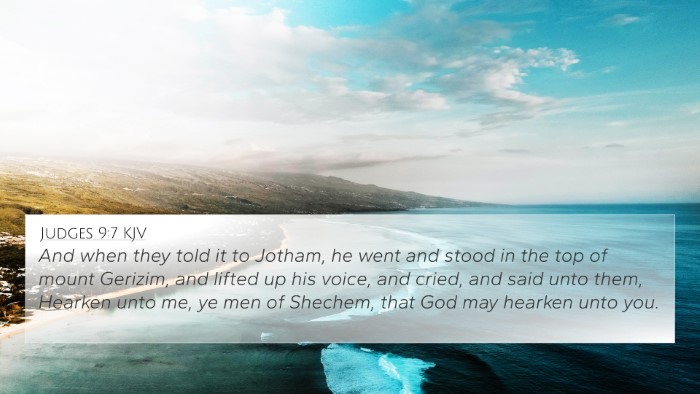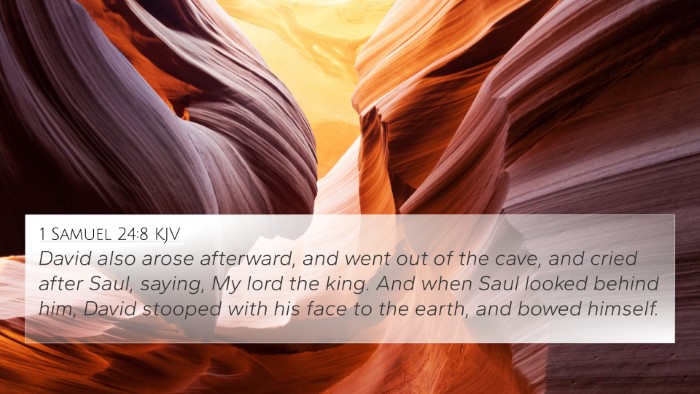Meaning and Interpretation of 1 Samuel 26:13
Verse: "And David went over to the other side, and stood on the top of a hill afar off; a great space being between them."
Summary of Insights
This verse captures a pivotal moment in David's life, portraying his wisdom and prudence in dealing with King Saul. The scene unfolds as David, having infiltrated Saul's camp, chooses not to engage in violence even when he has an opportunity to do so. This action speaks volumes about his character and his reliance on God for justice.
Commentary Insights
- Matthew Henry: He emphasizes the moral quality of David's character, outlining how David's choice to maintain distance rather than succumb to the temptation of retaliation exemplifies his deep faith and respect for God's anointed. Henry posits that this act reflects a profound understanding of divine providence.
- Albert Barnes: Barnes points out that the physical distance David maintained symbolizes the spiritual distance he kept from the desires for vengeance. He interprets this as a demonstration of higher moral grounds and a testament to David’s integrity. He highlights that David's actions reiterate his trust in God's timing and justice.
- Adam Clarke: Clarke explores the historical context surrounding this incident, noting the tension between David and Saul. He suggests that David's decision to position himself at a high point indicates a strategic mindset, enhancing his practice of wisdom in avoiding confrontation while still keeping an eye on his adversary.
Key Themes
- Trust in God: David’s actions reflect a strong reliance on divine timing rather than human judgment.
- Moral Integrity: The decision to stand back signifies a commitment to righteousness over vengeance.
- Strategic Wisdom: David's positioning shows careful planning and awareness of the situation he was in.
Bible Verse Cross-References
1 Samuel 26:13 can be better understood through the following cross-references:
- Psalms 1:1-2: These verses encourage believers to seek righteousness and refrain from the ways of the wicked, much like David's decision to abstain from attacking Saul.
- Romans 12:19: This verse advises against seeking revenge, which parallels David's decision to leave justice in God's hands.
- Matthew 5:44: Here, Jesus teaches on loving one's enemies, reflecting the higher moral ground taken by David.
- Proverbs 20:22: It states, "Do not say, 'I'll pay you back for this wrong!'", resonating with David's choice to forego vengeance.
- 1 Peter 2:23: This verse highlights how Jesus committed no retaliatory acts when he suffered, similar to David's demeanor toward Saul.
- Ecclesiastes 3:1-8: These verses discuss the appropriateness of times for various actions, similar to David's patience.
- Matthew 26:52: Jesus' statement about those who live by the sword, stressing the importance of peace over violence.
Thematic Connections
The events surrounding 1 Samuel 26:13 create strong thematic ties within the biblical narrative:
- Divine Justice: The overarching theme of trusting in God for justice resonates throughout various scriptures.
- Enemies and Forgiveness: The Bible is consistent in its teachings about how to deal with adversaries, emphasizing forgiveness and reliance on God's will.
- Leadership Qualities: The way David handles his conflict with Saul provides lessons in wise governance and moral leadership.
Conclusion
In summary, 1 Samuel 26:13 reflects a critical moment in David's journey, illustrating his commitment to righteousness, divine trust, and strategic thinking. Cross-references enhance our understanding of the theme of patience in the face of adversity and the virtue of non-violence, providing a rich tapestry of biblical truth for believers today.




